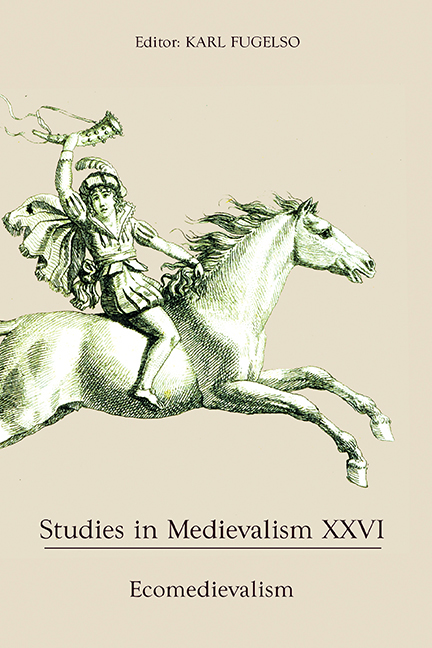Book contents
- Frontmatter
- Studies in Medievalism
- Acknowledgments
- Contents
- List of Illustrations
- Editorial Note
- I Ecomedievalism: Some Perspective(s)
- II Interpretations
- Fragmentary Dreams: John Aubrey's Medieval Heritage Construction
- Charter Horns and the Antiquarian Imagination in Early Modern England
- Giving Voice to Griselda: Radical Reimaginings of a Medieval Tale
- Medieval and Futuristic Hells: The Influence of Dante on Ellison's “I Have No Mouth and I Must Scream”
- Reading Westeros: George R. R. Martin's Multi-Layered Medievalisms
- Modernity in the Middle: The Medieval Fantasy of (Coopted) Feminism in Disney's Maleficent
- Future Medieval: (Neo)Medievalism in Babylon 5 and Crusade
- Cosmopolitan Anxieties and National Identity in the Netflix Marco Polo
- Mapping Everealm: Space, Time, and Medieval Fictions in The Quest
- Medievalisms of the Mind: Undergraduate Perceptions of the “Medieval” and the “Middle Ages”
- Mask of the Medieval Corpse: Prosopopoeia and Corpsepaint in Mayhem's De Mysteriis Dom Sathanas
- Contributors
- Miscellaneous Endmatter
Medievalisms of the Mind: Undergraduate Perceptions of the “Medieval” and the “Middle Ages”
from II - Interpretations
Published online by Cambridge University Press: 15 September 2017
- Frontmatter
- Studies in Medievalism
- Acknowledgments
- Contents
- List of Illustrations
- Editorial Note
- I Ecomedievalism: Some Perspective(s)
- II Interpretations
- Fragmentary Dreams: John Aubrey's Medieval Heritage Construction
- Charter Horns and the Antiquarian Imagination in Early Modern England
- Giving Voice to Griselda: Radical Reimaginings of a Medieval Tale
- Medieval and Futuristic Hells: The Influence of Dante on Ellison's “I Have No Mouth and I Must Scream”
- Reading Westeros: George R. R. Martin's Multi-Layered Medievalisms
- Modernity in the Middle: The Medieval Fantasy of (Coopted) Feminism in Disney's Maleficent
- Future Medieval: (Neo)Medievalism in Babylon 5 and Crusade
- Cosmopolitan Anxieties and National Identity in the Netflix Marco Polo
- Mapping Everealm: Space, Time, and Medieval Fictions in The Quest
- Medievalisms of the Mind: Undergraduate Perceptions of the “Medieval” and the “Middle Ages”
- Mask of the Medieval Corpse: Prosopopoeia and Corpsepaint in Mayhem's De Mysteriis Dom Sathanas
- Contributors
- Miscellaneous Endmatter
Summary
Though there have been continuing academic debates on when the European world became and ceased to be medieval (and all the resulting implications of this periodization), in broad terms, when a scholar joins a medieval history department or attends a conference on medieval studies, it is reasonable to assume that they know approximately what the word means. However, the answer to the question of how non-medievalists define the term “medieval” (and its cousin, “Middle Ages”) is significantly less clear. When it comes to popular perceptions of the medieval world, even this question, which comprises one of the most basic levels of popular mental medievalisms, has yet to be explored by academics with evidence stronger than theory, anecdote, or conjecture.
Seeking to answer the question “How do non-medievalists define the words ‘medieval’ and ‘Middle Ages’?” is significant if medievalists aim to communicate fluently with those outside our disciplines. It is hoped (particularly for those scholars interested in the popular perception of the Middle Ages) that the popular definitions might tack close to the academic ones – and feared that they diverge wildly. However, this is a hope without empirical evidence. This article seeks to begin to rectify this deficiency. And as will quickly become clear, it does not – and cannot – provide a clear, definitive answer to the question of how non-medievalists define those most-important words in our field. Instead, this article has three complementary aims. First, it explains a methodology that can be used by scholars interested in medievalism to gather empirical evidence to help the field more thoroughly explore these (and related) questions. Second, it reports some of the findings of one study (undertaken by me at the University of Leeds) that explored this question among British young adults. Finally, by exploring that evidence, it reveals some of the complexity inherent in how individuals imagine the medieval. These individuals’ definitions appear to lie somewhere between what a medievalist might hope and what they might fear about public perceptions of the medieval past.
- Type
- Chapter
- Information
- Studies in Medievalism XXVIEcomedievalism, pp. 213 - 236Publisher: Boydell & BrewerPrint publication year: 2017



